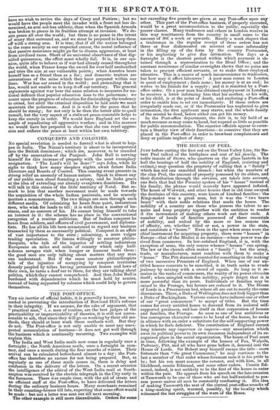THE POST-OFFICE.
THE vis inertia of official habits, it is generally known, has suc- ceeded in preventing the introduction of Rowland Hill's reforms in their integrity. If we assume, for the sake of argument, that "practical men," i. e. men of routine, are the best judges of the practicability- or impracticability of theories, it is still not unrea- sonable to ask, that since they will go on working by their old me- thods, they should at least work those methods well. But they do not. The Post-office is not only unable to meet. any unex- pected accumulation of business—it does not get well through the business which is continually recurring. Two examples will explain this. The India and West India mails now come in regularly once a fortnight ; the North American mails, once a fortnight in sum- mer, and once a month during the four months of winter. Their arrival can be calculated beforehand almost to a day : the Post- office has therefore no excuse for not being prepared. But, as regularly as one of these mails comes in, there is delay and confusion in the delivery of the letters. On a recent occasion the intelligence of the arrival of the West India mail at South- ampton was received by the electric telegraph in the City early in the forenoon. There was ample time, with the aid of steam and an efficient staff at the Post-office, to have delivered the letters during the ordinary business hours. Many merchants remained in their counting-houses till late, expecting that some effort would be made : but not a letter was sent out till next morning.
The other example is still more discreditable. Orders for sums
not exceeding five pounds are given at any Post-office upon any other. This part of the Post-office business, if properly executed, would be a great accommodation to the public, especially the poorer classes. Many tradesmen and others in London receive in this way remittances from the country in small sums to the amount of 30/. a week or upwards. Rarely a week elapses that a tradesman in the regular receipt of these orders has not three or four dishonoured on account of some informality in the filling up of the form by the country Postmaster, or his neglecting to give due intimation. Ten days or a fortnight is the shortest period within which payment is ob- tained through a representation to the Head Office ; and the constant recurrence of similar oversights shows that no pains are taken to procure efficient servants, or to make those employed attentive. This is a source of much inconvenience to tradesmen, but how may it affect labourers ? A poor man comes to London in quest of employment ; finds none ; his money is at an end ; he writes to his friends for a supply ; and it is remitted by a Post- office order. Or a poor man has obtained employment in London ; he receives a letter informing him that his mother, or his wife, or his child, is at the point ot death, and enclosing a Post-office order to enable him to set out immediately. If these orders are irregularly made out, or if the Postmaster has neglected to give intimation, the first applicant may starve, and the whole family of the second be dead, before either can get his money. In the Post-office department, the rule is, to lay hold of as much revenue as may come to hand, but expend as little as possible for public accommodation. The superior officials appear to enter- tain a Stanley view of their functions—to conceive that they are placed in the Post-office in order to browbeat complainants and deny or palliate neglect of duty.


























 Previous page
Previous page